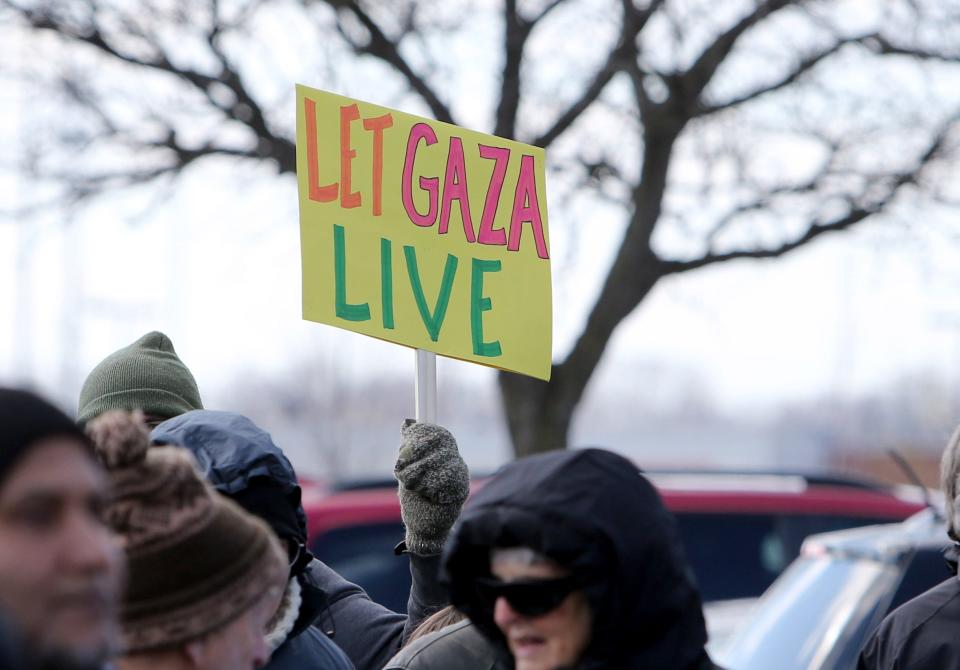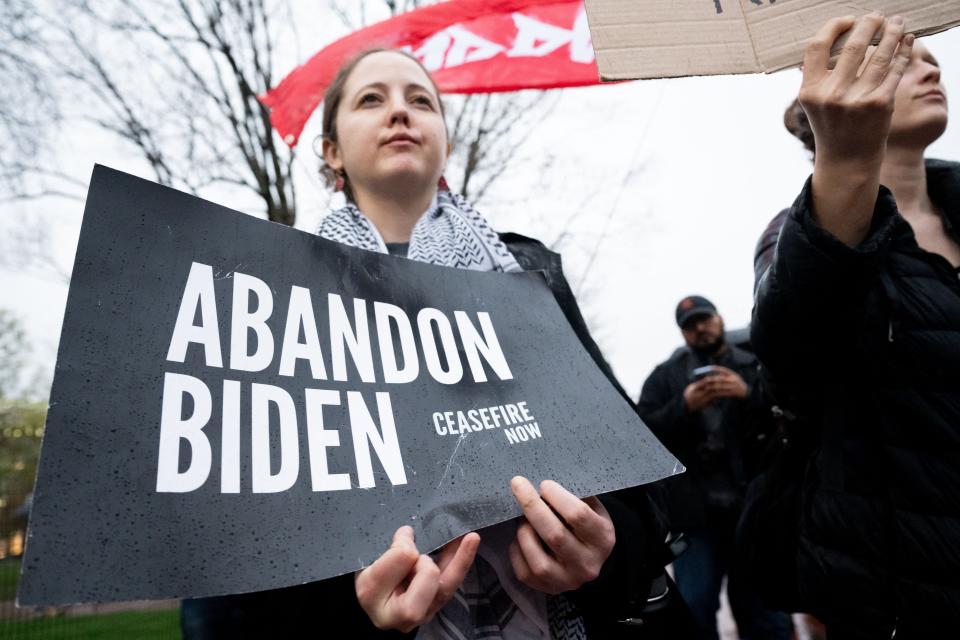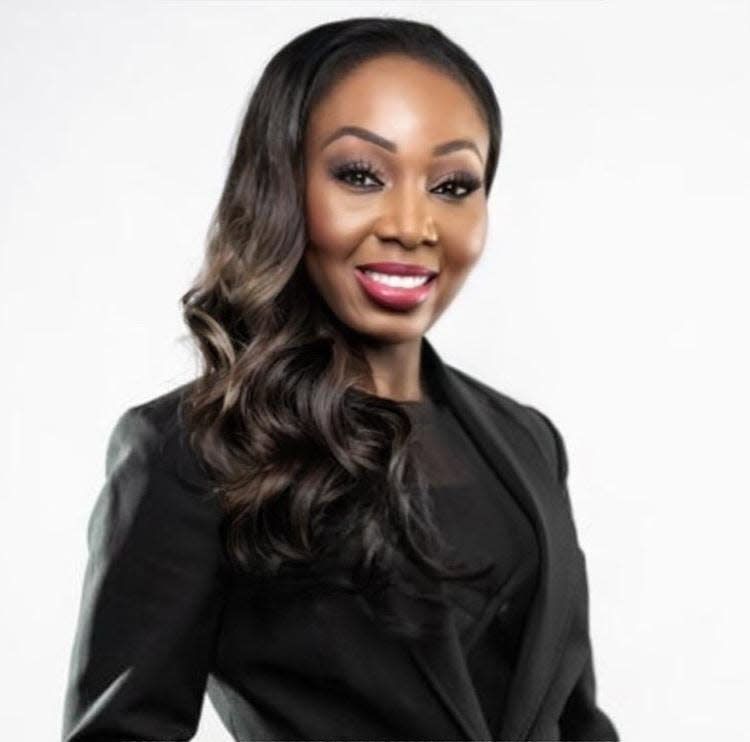Gaza is redefining the Christian vote. Biden and Trump better listen.
- Oops!Something went wrong.Please try again later.
- Oops!Something went wrong.Please try again later.
On April 4, 1967, at the Riverside Church in New York, the Rev. Martin Luther King Jr. mustered all his preacher’s might to damn the Vietnam War.
Declaring “my conscience leaves me no other choice,” he thundered that it was all Americans’ moral duty to speak out against the conflict.
His "Beyond Vietnam – A Time to Break Silence" speech was the beginning of the end for President Lyndon Johnson’s warmongering term.
It was also the moment Black Christianity went mainstream – showing, after years of Ku Klux Klan atrocities, that it possessed the might to send shockwaves through the highest corridors of power.
King had struck at the heart of the trauma of racial injustice by creating a moral framework rooted in Christian values to confront it, successfully fighting and reducing prejudice by arguing that the principles of love, unity, nonviolence and peace were the very fabric of our universe.
Today, as the Gaza conflict rages, with its death toll spiraling above 30,000, we are again bearing witness to this phenomenon.
Religious leaders are united on Gaza humanitarian crisis
As political leadership flounders on Gaza, Black pastors have demanded that President Joe Biden wake up to the horrors being inflicted in the territory – calling for a cease-fire through full-page ads in The New York Times, open letters and protests.
Black Christians, a key bloc in President Biden’s support base, look at the Gaza Strip and see not only a territory wrought with bloodshed and starvation, but also a legacy of injustice inflicted by decades of trauma and repression.
It’s far from the first time they have done so.
Opinion alerts: Get columns from your favorite columnists + expert analysis on top issues, delivered straight to your device through the USA TODAY app. Don't have the app? Download it for free from your app store.
In 1979, Andrew Young, a former U.S. ambassador to the United Nations, called on America’s Black clergymen to take on the Palestinian plight as their own: “We've reached the situation where in order to be liberated ourselves we must respond to the total liberation needs of people all over this planet.”
But there is an even more remarkable transformational taking place, one that could have huge repercussions for American politics.
The reawakening of a moral conscience among African American communities sparked by the Gaza conflict is now no longer limited to Black churches. It is expanding to America’s religious communities at large.

From Washington, D.C., to California, there is a growing peace movement led by multidenominational Christian, Muslim and Jewish leaders.
Only 10 days into the violence in Israel and Gaza, the Quaker organization Friends Committee on National Legislation joined a coalition of more than 70 interfaith and nongovernmental organizations to demand a cease-fire between Israel and Hamas.
Most voters want Gaza cease-fire. Do Jewish, evangelical faithful agree?
The sheer volume of pushback from religious groups is because Gaza’s horror is not one confined to Muslims, or groups with liberal or Democratic ideologies. It has become a touchstone for the moral convictions that underpin all faiths, all around the world.
Pope Francis urged world leaders to find an end to the conflict. Groups such as the Muslim World League (MWL) – the largest Islamic nonprofit organization in the world – petitioned the release of hostages and called for a cease-fire. More than 30 rabbis and rabbinical students staged a protest at the U.N.
As MWL’s secretary general, Mohammad bin Abdulkarim Al-Issa, said while he called for an unprecedented Muslim-Jewish coalition: “Our task now, as faith leaders who reach billions, is to spread messages of peace from every synagogue, mosque and church around the world, messages which explicitly seek to acknowledge the ‘other.’ ”
Partnerships among faith bodies are being forged in the face of Gaza. And in America, traditional Christian Zionist circles and steadfast Republican supporters are waking up, too.
Evangelicals – a bedrock of support for former President Donald Trump – have seen support for Israel plummet by 50% among their younger age groups.
And following the devastating attacks on Catholic and Christian churches in Gaza in December, America’s largest ecumenical body, the National Council of Churches, signed a letter demanding a cease-fire.
Biden can't win in 2024 without heeding calls for peace

This activism blended across denominational lines is the product of hard-won historical traditions, theological reevaluations and a response to urgent social justice issues – including the devastating police brutality that’s terrorized African American communities for generations.
Events that sparked movements like Black Lives Matter have galvanized communities across the United States, including mainstream Christian groups, who now view faith as inseparable from pressing moral and social issues.
This is especially true among younger generations, with more than half of millennials and Generation Z worried about racial justice.
Biden's Gaza policy is election issue: Wisconsin voters reminded Biden his support of Israel is a problem. He's not listening.
Unlike the 1960s, social media is now providing ever-larger windows into human suffering, and whether it’s George Floyd or Gaza, youth from all denominations are viewing moral and social issues as their religious – and political – calling.
But it’s going to take more than Biden joining TikTok to win back these voters. The results from Super Tuesday reveal that not only will we see a Trump-Biden rematch, but that policies around the worsening situation in Gaza will heavily impact the final ballot results.
The more than 100,000 “uncommitted” votes during Michigan’s Democratic primary and the 19% of Democrats in Minnesota refusing to cast their vote for Biden are just the tip of the iceberg.
The phenomena of Black Christian activism seeping into mainstream Christian movements and impacting both Biden and Trump’s campaign cannot be underestimated.
The cracks in Trump’s support base are even on display among right-wing mouthpieces, with Islamophobic conspiracy theorist Laura Loomer and pro-Russia MAGA influencer Jackson Hinkle turning on each other over the Israel-Hamas conflict.

Right now, we are witnessing a radical transformation of America’s political and electoral landscape as it continues to merge with Muslim and Arab Americans, Jews and others who are demanding peace and a change in policy priorities. That is something neither candidate can afford to overlook.
Ultimately, Dr. King did not change minds without also understanding the conditions of the heart. Political leaders will come and go; those who survive the scrutiny of time recognize that this call for peace and equality is universal.
Nathalie Beasnael is a Faith Elder at the Christ Citadel International Church in Los Angeles, where it has been serving a largely African American congregation for more than three decades. She holds an honorary doctorate in Divinity and has been a longstanding African American Christian activist.
You can read diverse opinions from our Board of Contributors and other writers on the Opinion front page, on Twitter @usatodayopinion and in our daily Opinion newsletter.
This article originally appeared on USA TODAY: Christian leaders want Gaza ceasefire. Biden and Trump should listen

